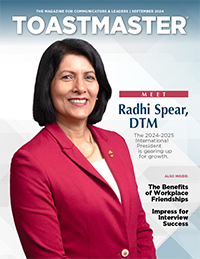
My first love was always performing. I acted in plays throughout high school, majored in theater in college, and eventually moved to New York City to pursue my dream of becoming an actress. Being onstage and moving an audience to laughter or tears felt like I was living my purpose. I loved learning about a character and slowly transforming myself into another human. I felt at home onstage.
When my daughter was born, I experienced a love that was even more powerful. My life purpose shifted. Being a mom was the role of a lifetime. I quit acting and took a job in the business world to minimize my time away from her.
When I made the career shift, I discovered I had a paralyzing fear of stepping onstage as myself without the cloak of a character and pre-scripted dialogue. My voice became shaky, and I suffered from panic attacks when I presented. After performing for thousands, my fear of public speaking was deeply embarrassing on a personal level, and I knew it would stifle me professionally. I had to overcome this fear.
My first step was to join Toastmasters. My dad had been a Toastmaster, so I was familiar with the organization. As an actress, I always relied on rehearsals to develop my character. Being in Toastmasters gave me a safe space to practice standing up as myself. I became comfortable using the skills already in my toolbox as a performer to speak with power, polish, and poise. I learned how to transform my anxiety into helpful energy that fueled my speeches.
Now I use the following five steps to calm my body and center my mind before speaking:
1 Breathe.
Shallow breathing is one of the body’s responses when the nerves kick in. Counteract this by taking big, slow diaphragmatic breaths (think of sending breath all the way to your toes). Make sure the exhale is longer than the inhale to activate the parasympathetic nervous system and calm the body. Inhale to the count of eight, exhale to the count of 12. Repeat. Feel the body calm.
2 Keep a success journal.
Through my coach training, I learned the importance of documenting success. I started keeping a notebook detailing what I liked about every speech and one or two things that I would like to improve on (keeping the emphasis on what went right). I added inspirational quotes and pictures of people who inspire and/or support me. I review the notebook prior to every speech. Focusing on the positive sets you up for success.
3 Move your body.
Backstage before a play, I always did a physical warm-up. When the nerves kick in, the body overproduces adrenaline, which can cause increased blood flow to your organs and speed up your heart rate. By jumping up and down and shaking out my arms and legs, I could channel this adrenaline into focused energy. Move your body in whatever way works for you—take a brisk walk around the block or put on some music and dance! Even squeezing your toes or shaking your hands can be helpful. Let go of the excess energy to center your body and calm your mind.
4 Positive self-talk.
If, like me, you have had a “less than perfect” experience with public speaking, you may have a saboteur lurking in your subconscious. Be kind to yourself. I use a mantra or give myself a pep talk to combat that voice of negativity. I repeat the word “calm” or “I am enough” before I speak.
5 Focus on the audience.
Through Toastmasters, I learned to always arrive early where I am speaking and talk with other people in the room. Even a moment of connection is enough to channel the sometimes-dormant extrovert in me. As the meeting starts and I await my time to speak, I focus on the “why” of the speech. I remind myself it’s not about me; it’s about them. What do I want the audience to do, feel, think, or learn? Once you tune in to the goal of the speech and focus on the audience, the purpose becomes greater than the fear, and the mind and body relax.
Next time you start to feel those nerves, review your success journal, remind yourself that you are fabulous, take a few deep soulful breaths, squeeze your toes, get up to speak, and make magic happen!
Dianne Glover is an executive speech coach and member of Stone Oak Toastmasters in San Antonio, Texas. Visit www.dianneglover.com or email dianne@dianneglover.com to connect.


 Previous
Previous

 Previous Article
Previous Article


